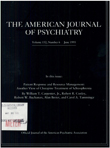Histories of sexual victimization in patients with irritable bowel syndrome or inflammatory bowel disease
Abstract
OBJECTIVE: Two reports have suggested a possible association between a history of sexual trauma and irritable bowel syndrome, but several factors in their study designs limited their generalizability. The authors used a more rigorous methodology to confirm this association. METHOD: They administered structured psychiatric and sexual trauma interviews to 28 patients with irritable bowel syndrome and 19 patients with inflammatory bowel disease and compared prevalence rates of sexual victimization in the two groups. RESULTS: Compared with patients diagnosed as having inflammatory bowel disease, patients with irritable bowel syndrome had a significantly higher rate of severe lifetime sexual trauma (32% versus 0%), severe childhood sexual abuse (11% versus 0%), and any lifetime sexual victimization (54% versus 5%). The nine patients who had experienced severe lifetime victimization had significantly higher odds ratios for lifetime depression, panic disorder, phobia, somatization disorder, alcohol abuse, functional dyspareunia, and inhibited sexual desire than the 38 patients who had experienced less severe sexual trauma or no trauma. A logistic regression analysis showed that gender, the number of medically unexplained physical symptoms, and self-reported anxiety and hostility accounted for all of the variance in the victimized group. CONCLUSIONS: These preliminary results suggest that sexual victimization may be an important factor in the development of irritable bowel syndrome in some patients. Future studies attempting to categorize subgroups of patients with irritable bowel syndrome should inquire into past histories of sexual victimization.
Access content
To read the fulltext, please use one of the options below to sign in or purchase access.- Personal login
- Institutional Login
- Sign in via OpenAthens
- Register for access
-
Please login/register if you wish to pair your device and check access availability.
Not a subscriber?
PsychiatryOnline subscription options offer access to the DSM-5 library, books, journals, CME, and patient resources. This all-in-one virtual library provides psychiatrists and mental health professionals with key resources for diagnosis, treatment, research, and professional development.
Need more help? PsychiatryOnline Customer Service may be reached by emailing [email protected] or by calling 800-368-5777 (in the U.S.) or 703-907-7322 (outside the U.S.).



